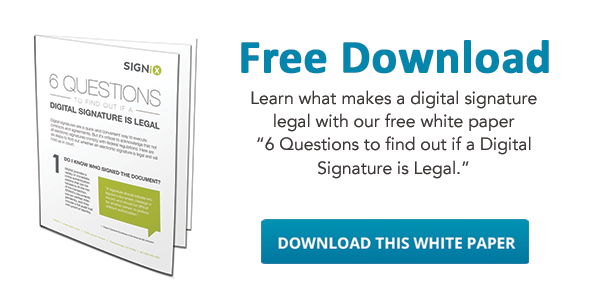 There’s a lot of information on the Internet about the legality of electronic signatures. In fact, there’s so much that it’s easy to get overwhelmed. If you don’t know where to start in your quest to understand legal issues surrounding electronic signatures, here’s our top five favorite resources on the topic.
There’s a lot of information on the Internet about the legality of electronic signatures. In fact, there’s so much that it’s easy to get overwhelmed. If you don’t know where to start in your quest to understand legal issues surrounding electronic signatures, here’s our top five favorite resources on the topic.
“6 Questions to Find Out if a Digital Signature is Legal” — This white paper details the six questions you should ask to find out if an e-signature solution would stand up in court if it’s challenged. It also lists the five laws and regulations all e-signature vendors should follow. You can download it for free to view on your computer or print it out.
FDIC ESIGN Compliance Guide — The FDIC has a special section in its compliance manual that deals with the ESIGN Act and its implications. It’s worth a read, especially if you work at a financial institution looking to adopt e-signatures.
“How the ESIGN Act Changed the Way We Do Business” — Anyone who’s opened a bank account from their living room or applied for a loan at midnight knows how much the Internet has changed the way we do business. But you might not know that these transactions are possible because of a little piece of legislation from more than a decade ago: the Electronic Signatures in Global and National Commerce Act (ESIGN Act). This article gives a broad overview of the ESIGN Act and its history.
“What is the Uniform Electronic Transaction Act (UETA)?” — This article gives details about UETA, from its history to its implications. It’s a good introduction for those who don’t know much about electronic transaction legislation.
“Digital Signature Guidelines” — The American Bar Association has developed a book of guidelines to determine whether an e-signature is legal. If you want an in-depth look at legal issues surrounding digital signatures, this is the book for you. You can buy it directly from their website for $34.95. If you’d rather not pay money for that information, you can get a summary of their guidelines by reading the article “What Makes a Digital Signature Legal?”
%20formatted-1.png?width=2528&height=739&name=SIGNiX%20Logo%20Main%20(white)%20formatted-1.png)


